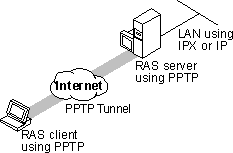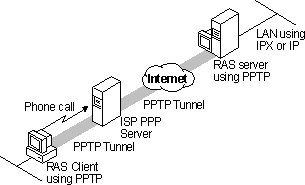
A RAS client that has a PPTP driver as its WAN driver can access resources on a remote LAN by connecting to a Windows NT RAS server through the Internet. There are two ways to do this: By connecting directly to the Internet or by dialing an Internet Service Provider (ISP) as shown in the following examples.
The client that is directly connected on the Internet dials the number for the RAS server. The PPTP driver on the client makes a tunnel through the Internet and connects to the PPTP enabled adapter on the RAS server. After authentication, the client can access the corporate network, as shown in the figure below.
Note
Connecting directly to the Internet means direct IP access without going through an ISP. (For example, some hotels allow you to use an Ethernet cable to gain a direct connection to the Internet.)

The same functionality is achieved by calling an ISP instead of being directly connected to the Internet. The client first makes a call to the ISP. After that connection is established, the client makes another call to the RAS sever located anywhere on the Internet or the ISP and that establishes the PPTP tunnel.

At Terra Flora, the clients are directly connected to the Internet, no ISP is used. The RAS servers at headquarters and Seville will dial directly into the Internet.
Data sent across the PPTP tunnel is encapsulated in PPP packets. Because RAS supports encryption, the data will be encrypted. RAS supports bulk data encryption using RSA RC4 and a 40-bit session key that is negotiated at PPP connect time between the RAS client and the Windows NT RAS server.
PPTP uses the Password Authentication Protocol and the Challenge Handshake Authentication Protocol encryption algorithms.
In addition to supporting encrypted PPP links across the Internet, a PPTP-based solution also enables the Internet to become a network backbone for carrying IPX and NetBEUI remote-access traffic. PPTP can transfer IPX traffic because it encapsulates and encrypts PPP packets so that they can ride TCP/IP. Thus, a solution does not depend only on TCP/IP LANs.
This technology gives Terra Flora the opportunity to send sensitive materials over the Internet, an option that they haven't had previously. They will use this connection to collect general ledger information from Seville and to provide to Seville marketing information such as product special pricing and corporate advertisements which will be incorporated into network web pages.